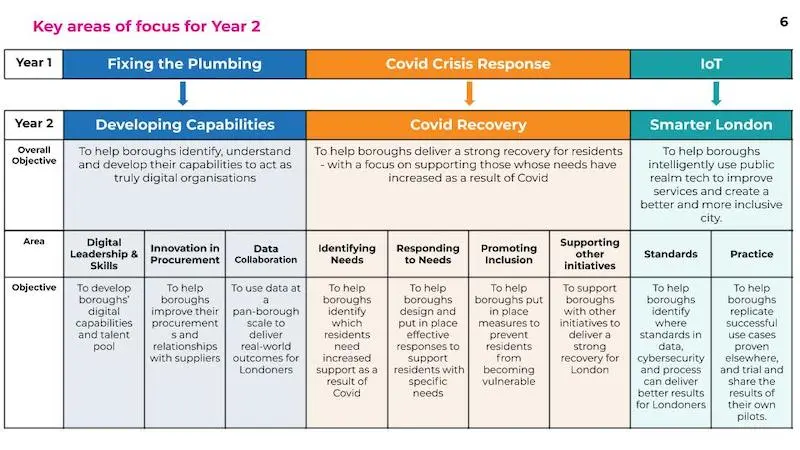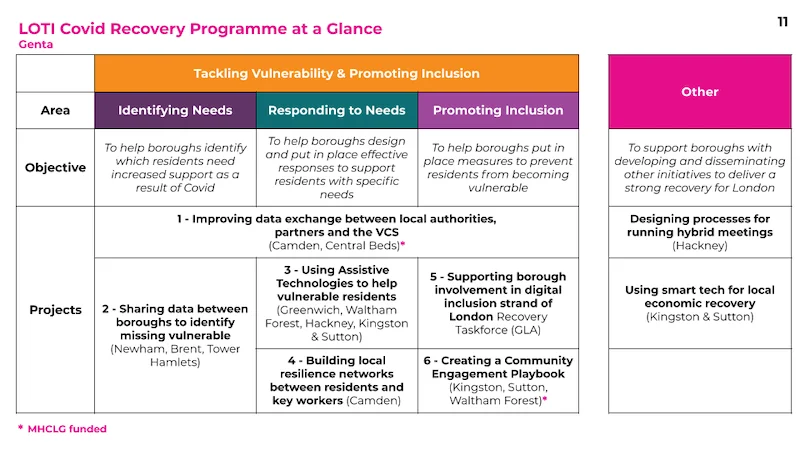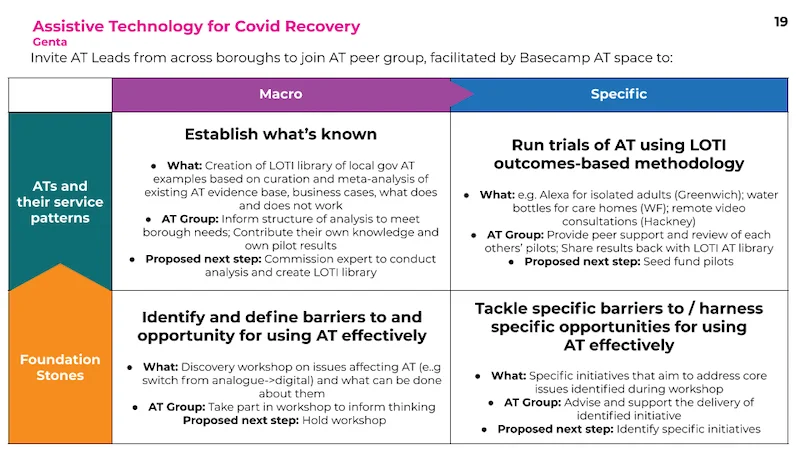LOTI: Weeknote 55
LOTI in Year 2
We started the week with a meeting with our members to discuss our strategy and forward plan for the coming year. We set out our strategic priorities – and the projects within them – as well as our budget and funding principles. We agreed to focus on areas where:
- The intended outcome is important and meaningful
- There’s a role for digital, data and/or innovation
- It’s within our sphere of influence to make change happen
- There’s clear added value from collaboration
 We will share further information about our strategy, projects and next steps for Year 2 in due course.
We will share further information about our strategy, projects and next steps for Year 2 in due course.
LOTI’s role in Covid-19 recovery
We also discussed LOTI’s Covid-19 recovery efforts. We chose to primarily focus on supporting London boroughs to identify and respond to the growing needs of their residents and promote inclusion. We proposed working on six projects, put forward by our members, which speak to three main areas of work:
- Identifying needs (whose needs have increased and in what ways?)
- Responding to needs (how can we address specific needs?)
- Promoting inclusion (how can we head off vulnerability before needs emerge?)
 Two of these projects are being funded by the Ministry of Housing, Communities and Local Government’s (MHCLG) Covid-19 Digital Challenge fund. LOTI is keen to support the others and will set aside the budget to help them. We discussed the timeline for their delivery and LOTI’s role in each.
Two of these projects are being funded by the Ministry of Housing, Communities and Local Government’s (MHCLG) Covid-19 Digital Challenge fund. LOTI is keen to support the others and will set aside the budget to help them. We discussed the timeline for their delivery and LOTI’s role in each.
We shared a summary of our first meeting with colleagues from the London Borough of Camden, Central Bedfordshire Council, the Greater London Authority (GLA), and a number of Voluntary Community Services (VCS) focusing on their ‘Improving data exchange between local authorities, partners and the VCS‘ project (you can find this in weeknote 54). A deeper dive discovery to identify the needs of local residents and communities will be conducted in the coming weeks.

We also shared our desired approach to supporting pan-London Assistive Technology (AT) pilots. Fundamentally, this falls into four distinct categories:
- Establishing what we know
- Identifying and defining what barriers there are to using AT effectively
- Collectively tackling barriers to using AT effectively
- Collaborating on AT pilots using LOTI’s Outcomes-Based Methodology
Members agreed that there was more work to be done on part 1. before moving on to shared experiments. To this end, we met with our AT leads in London Boroughs of Hackney, Kingston and Sutton and Harrow to explain our thinking. We know that some boroughs are interested in running pilots, and want to ground them on what we already know before doing so. We plan to host discovery workshops in late September to uncover what issues are holding back the sector and approach potential solutions for removing these barriers collectively. The full slides of the workshop are available here.
Using data to further cultural change
Earlier in the year, we shared our thinking on how to explain to CEOs why fixing the plumbing matters. In that blog, we explained that while LOTI’s activities are primarily driven by each borough’s Chief Information or Chief Digital Officer (CIO and CDO), ultimately LOTI was established to demonstrate whole-organisation value and deliver real-world outcomes for Londoners.
Last week, we were approached by the Chief Executives London Committee (CELC) to share our perspective and approach to using data to better understand the experiences faced by Black, Asian and Minority Ethnic (BAME) officers in councils, as well as residents. In response to the Black Lives Matter agenda, CELC has created a task and finish group dedicated to tackling racial inequality in London. So far, they’ve conducted a survey on officers which has challenged their thinking on identity and intersectionality. They concluded that ‘BAME’ might not be the most useful categorisation to understand individual experiences and are currently exploring different approaches to further develop their strategy. One of which is to improve the data collection and analysis process.
It was important for us to explain that data is not, in and of itself, a silver bullet. Jay Saggar (Data Projects Manager, LOTI) explained that data is an enabler for delivering outcomes and shouldn’t be seen as the starting point of any change programme. We outlined issues around bias in data that are particularly relevant when looking at sensitive matters such as race, as well as neutrality. In this case, data might be collected by people within institutions where power and trust might be at odds.
LOTI presentation to CELC - Data Projects MethodologyWe shared how this group might choose to use data as an enabler to achieve some of their desired outcomes. Using LOTI’s Data collaboration projects methodology, we advised that they start with the outcomes in mind by defining what exactly they are trying to achieve, before exploring what needs to change, what insights people would need to make the necessary changes, and what other data enablers are required. The full presentation is available here.
This Week
This week, the LOTI Central Team will be:
- Meeting with Nitrous (our Thirty3 platform developers, as part of the City Tools project) to agree on the next steps for onboarding boroughs.
- Holding our ‘Innovation in Procurement’ project kick-off meeting.
- Planning for our virtual celebration at London Tech Week 2020, after meeting our target of recruiting 100 Digital Apprentices in member boroughs.
For the daily download on all things LOTI, be sure to follow us on Twitter.
Eddie Copeland


